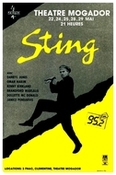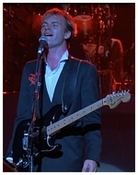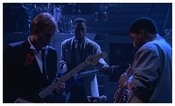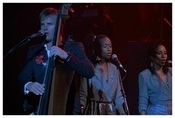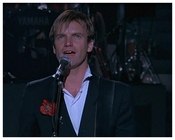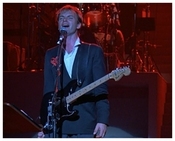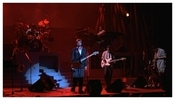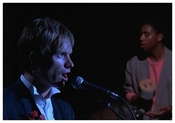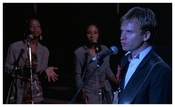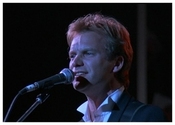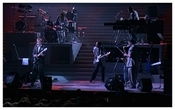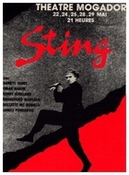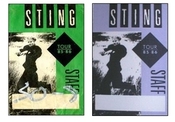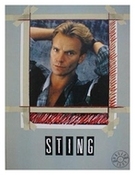
The Police in Paris...
Journalists from all over Europe flew in to attend Sting's blatantly stage-managed press conference at the Pompidou Centre this week at which the star presented his new band of eminent young jazz musicians while Michael Apted's camera preserved the scene for a forthcoming film. Nobody had been supplied with a copy of Sting's forthcoming LP 'The Dream Of The Blue Turtles', so questioning centred on his girlfriend's new baby. Absolutely riveting.
Sting was booked into the Mogador Theatre as a prelude to a world tour, and on this evidence the unit still has some shaking down to do, though the quality of the individual players could scarcely be bettered. On drums is Weather Report's Omar Hakim. Branford Marsalis, brother of prodigious trumpeter Wynton and a respected soloist in his own right, plays the saxophones. Kenny Kirkland is on keyboards, while Sting has moved over from bass to guitar to make way for Darryl Jones, who provided Miles Davis with the vertebrae-loosening riff for 'Decoy'. Dolette MacDonald and Janice Pendarvis dance and add backing vocals.
The strongest of the new songs appear to be 'We Work The Black Seam' (inspired by the miners' strike) with its beautiful chorus, a prowling blues called 'Consider Me Gone', and an ambitious piece of melodrama entitled 'Moon Over Bourbon Street'. In the latter, Sting suspended his husky vocal line over a mock-baroque interchange between Kirkland and Marsalis.
Elsewhere, the material suffered from a curious heavy-handedness, with the group appearing to mistake density for power. Children's Crusade, for example, felt both over-written and overplayed. Sting has never been afraid to charge headlong into topics as trivial as nuclear war or evolution, and some of his new lyrics are distressingly ''meaningful'', like a man trying to summarise Proust in four minutes flat.
Some Police material was included too, most notably the bubbling 'One World' and a tropical, sensual 'Driven To Tears'. Sting also played stripped-down readings of 'Roxanne' and 'Message In A Bottle'. But this excellent squad of musicians has not fundamentally changed his songwriting, and Sting will have his work cut out to better his finest moments with The Police. More evidence, presumably, from the album.
(c) The Guardian by Adam Sweeting
Sting's solo debut...
For his solo debut Sting has recruited an aggregate of the finest jazz-rock players in the business. That he can command the services of such heavyweight musicians as the drummer Omar Hakim (Weather Report), the bassist Darryl Jones (Miles Davis Band), the keyboardist Kenny Kirkland and the saxophonist Branford Marsalis is as much as mark of the respect with which Sting is regarded as a musician as it is of his ability to pay the doubtless enormous wages bill.
As one might expect, the show was a highly sophisticated exposition, featuring songs from the forthcoming album 'The Dream Of The Blue Turtles' and a few Police numbers reworked in a jazz or funk vein. Although it was interesting to hear the latter, particularly the sweet soul music version of 'Bring On The Night', it must be said that they lacked the tensile attack of the original versions and could be described, appropriately in this city, as très chic.
The new material was more promising, particularly where the band was able to hit a cool swing stride as on 'Consider Me Gone', and 'Moon Over Bourbon Street'. Sting was in fine voice, Branford Marsalis's sax gilded the performance throughout with his rich, resonant timbre, and Omar Hakim played a fierce drum section during the climax of 'I Burn For You' (from 'Brimstone & Treacle').
What seemed to be missing was a sense of adventure. This group is a departure from Sting's work with the Police but, whereas Andy Summers's and Stewart Copeland's individual projects have revealed a more radical side to their musicianship. Sting's need to experiment, though partly fulfilled, has been subjugated to his desire to keep an eye on the main chance.
Many of the numbers played were skilful and unusual pop songs which will provide Sting with the hit records he desires. Bit the live performances would have benefited immeasurably by his musicians being given their heads more freely and being less confined to the role of a backing band.
(c) The Times by David Sinclair
Journalists from all over Europe flew in to attend Sting's blatantly stage-managed press conference at the Pompidou Centre this week at which the star presented his new band of eminent young jazz musicians while Michael Apted's camera preserved the scene for a forthcoming film. Nobody had been supplied with a copy of Sting's forthcoming LP 'The Dream Of The Blue Turtles', so questioning centred on his girlfriend's new baby. Absolutely riveting.
Sting was booked into the Mogador Theatre as a prelude to a world tour, and on this evidence the unit still has some shaking down to do, though the quality of the individual players could scarcely be bettered. On drums is Weather Report's Omar Hakim. Branford Marsalis, brother of prodigious trumpeter Wynton and a respected soloist in his own right, plays the saxophones. Kenny Kirkland is on keyboards, while Sting has moved over from bass to guitar to make way for Darryl Jones, who provided Miles Davis with the vertebrae-loosening riff for 'Decoy'. Dolette MacDonald and Janice Pendarvis dance and add backing vocals.
The strongest of the new songs appear to be 'We Work The Black Seam' (inspired by the miners' strike) with its beautiful chorus, a prowling blues called 'Consider Me Gone', and an ambitious piece of melodrama entitled 'Moon Over Bourbon Street'. In the latter, Sting suspended his husky vocal line over a mock-baroque interchange between Kirkland and Marsalis.
Elsewhere, the material suffered from a curious heavy-handedness, with the group appearing to mistake density for power. Children's Crusade, for example, felt both over-written and overplayed. Sting has never been afraid to charge headlong into topics as trivial as nuclear war or evolution, and some of his new lyrics are distressingly ''meaningful'', like a man trying to summarise Proust in four minutes flat.
Some Police material was included too, most notably the bubbling 'One World' and a tropical, sensual 'Driven To Tears'. Sting also played stripped-down readings of 'Roxanne' and 'Message In A Bottle'. But this excellent squad of musicians has not fundamentally changed his songwriting, and Sting will have his work cut out to better his finest moments with The Police. More evidence, presumably, from the album.
(c) The Guardian by Adam Sweeting
Sting's solo debut...
For his solo debut Sting has recruited an aggregate of the finest jazz-rock players in the business. That he can command the services of such heavyweight musicians as the drummer Omar Hakim (Weather Report), the bassist Darryl Jones (Miles Davis Band), the keyboardist Kenny Kirkland and the saxophonist Branford Marsalis is as much as mark of the respect with which Sting is regarded as a musician as it is of his ability to pay the doubtless enormous wages bill.
As one might expect, the show was a highly sophisticated exposition, featuring songs from the forthcoming album 'The Dream Of The Blue Turtles' and a few Police numbers reworked in a jazz or funk vein. Although it was interesting to hear the latter, particularly the sweet soul music version of 'Bring On The Night', it must be said that they lacked the tensile attack of the original versions and could be described, appropriately in this city, as très chic.
The new material was more promising, particularly where the band was able to hit a cool swing stride as on 'Consider Me Gone', and 'Moon Over Bourbon Street'. Sting was in fine voice, Branford Marsalis's sax gilded the performance throughout with his rich, resonant timbre, and Omar Hakim played a fierce drum section during the climax of 'I Burn For You' (from 'Brimstone & Treacle').
What seemed to be missing was a sense of adventure. This group is a departure from Sting's work with the Police but, whereas Andy Summers's and Stewart Copeland's individual projects have revealed a more radical side to their musicianship. Sting's need to experiment, though partly fulfilled, has been subjugated to his desire to keep an eye on the main chance.
Many of the numbers played were skilful and unusual pop songs which will provide Sting with the hit records he desires. Bit the live performances would have benefited immeasurably by his musicians being given their heads more freely and being less confined to the role of a backing band.
(c) The Times by David Sinclair

